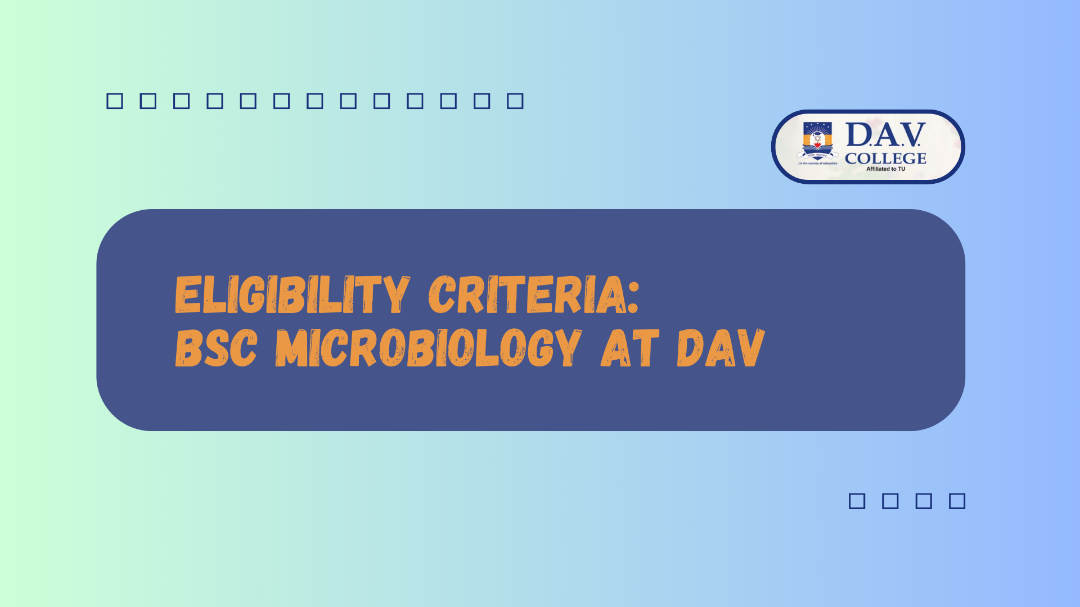Eligibility Criteria for BSc Microbiology in Nepal
Published on 2025-07-24

Eligibility Criteria for BSc Microbiology in Nepal (2025 Guide)
If you're passionate about exploring the microscopic world of bacteria, viruses, fungi, and other microorganisms, then BSc Microbiology is a decisive first step. But before you explore this intriguing field, it’s essential to understand whether you meet the qualifications to apply. This guide breaks down the eligibility criteria for a BSc in Microbiology in Nepal, helping you confidently prepare for admission to top institutions in the country.
What is BSc Microbiology?
BSc Microbiology is a 4-year undergraduate program under the Faculty of Science or the Faculty of Health Science (depending on the university), focused on the study of microscopic organisms and their impact on humans, animals, plants, and the environment. It combines theory with practical lab work, opening doors to careers in healthcare, agriculture, pharmaceuticals, research, and environmental science.
General Eligibility Requirements
Let’s go straight to the point—here are the academic and procedural requirements that most colleges and universities in Nepal follow for admission into BSc Microbiology.
1. Academic Qualification
To be eligible, you must have completed 10+2 or equivalent in the science stream with a focus on Biology. This includes:
- +2 Science (Biology Group) under NEB (National Examination Board)
- A-Level (Science) with Biology as a subject (minimum of 3 subjects passed)
- CBSE/ISC or equivalent board with a science background and Biology
Your major subjects should include:
- Biology (mandatory)
- Chemistry (mandatory)
- Physics/Mathematics (optional in some institutions)
Most universities require a minimum aggregate of 50% or a C grade or higher in all major science subjects, although this may vary slightly from institution to institution.
2. Entrance Examination
Top universities and private colleges in Nepal often conduct entrance exams to assess eligibility and filter candidates. For example:
- Tribhuvan University (TU): Requires passing its centralized entrance test for BSc programs.
- Pokhara University: May conduct its entrance test or evaluate based on academic records and an interview.
- Purbanchal University: It has a written entrance followed by an interview round.
These exams typically cover:
- Biology
- Chemistry
- Physics
- English and General Knowledge (in some cases)
Scoring well in the entrance test is crucial, as merit-based selection is highly competitive due to the limited number of available seats.
3. Minimum Grade Requirements
For NEB graduates:
- Minimum C grade in each subject
- An overall 2.0 GPA or higher (or equivalent)
For A-Level students:
- At least Grade D in Biology, Chemistry, and Physics
- An equivalency certificate from the Curriculum Development Centre (CDC), Nepal, is mandatory
4. Age Limit
Most institutions do not impose an age limit, but you should ideally apply within 2 years of passing +2 or equivalent.
5. Equivalency Certificate (For Non-NEB Students)
If you’ve completed your secondary education from a foreign board, such as Cambridge, CBSE, or any other international curriculum, you'll need to obtain an equivalency certificate from CDC Nepal. Without this, you cannot legally enroll in a Nepali university.
Special Considerations (College-Specific)
While the above requirements apply to most colleges, here’s a quick look at what some leading institutions expect:
Institution Entrance Requirement Minimum Grade Notes
Tribhuvan University (TU) Yes (IOST Entrance) 50% or C Grade High competition
Pokhara University Varies GPA 2.0+ Interview may be required
Kathmandu University (KU) Yes (KUCAT) GPA 2.0+ Rigorous exam
Purbanchal University Yes 50%+ in Science Practical-heavy program
DAV College TU Affiliated – TU Criteria 50%+ Known for strong lab training
Pro tip: Always check the individual college’s official website for the most accurate and up-to-date admission notices and requirements.
Who Should Apply?
If you meet the above criteria, here are a few indicators that a BSc in Microbiology could be a great fit:
- You're curious about how invisible organisms shape our world.
- You’re comfortable in laboratory settings.
- You’re aiming for careers in health, research, food technology, or pharmaceuticals.
- You’re considering further study (MSc Microbiology, Immunology, etc.)
What Happens After You Get In?
Once you're enrolled, your four years will include:
- Core courses in microbiology, virology, parasitology, and genetics
- Regular lab work
- Field studies and research projects
- Optional internships or job placements (in some colleges)
It’s an academically demanding but advantageous path that prepares you for both employment and higher studies.
Ineligibility Scenarios
To avoid confusion during the admission process, be aware that you're likely not eligible if:
- You studied management or humanities in +2, without Biology
- Your GPA is below 2.0, or you’ve failed a primary science subject
- You lack the equivalency certificate if you're from a foreign board
- You missed the entrance deadline or failed the entrance exam
Final Checklist Before Applying
Here’s what you should gather:
- Original mark sheets (+2 or A-Level)
- Citizenship certificate
- Recent passport-sized photos
- Equivalency certificate (if applicable)
- Entrance exam admit card
- Personal statement (if required by the college)
- Application fee payment proof
Make copies of all documents and keep the digital versions ready for online applications.
Conclusion
Admission to a BSc Microbiology program in Nepal requires more than just interest—you need the right academic background, a strong entrance performance, and timely documentation. By understanding the eligibility criteria and preparing in advance, you put yourself in the best position to start a journey into one of science’s most fascinating disciplines.
Whether you're aiming to become a clinical microbiologist, researcher, or biotech innovator, this program is your launchpad.
Frequently Asked Questions
Can I study BSc Microbiology if I have studied Mathematics instead of Biology in +2?
No. Biology is a core requirement for BSc Microbiology. You must have studied Biology as a primary subject in your +2 or equivalent.
What if I have a D grade in one subject—am I still eligible to participate?
Generally, you must score at least a C grade in all major science subjects. A D grade may disqualify you unless the institution explicitly allows it under special provisions.
Do private colleges have different eligibility criteria from government colleges?
Private colleges usually follow the guidelines of the university they’re affiliated with (e.g., TU, PU, KU), so the criteria are essentially the same. However, private colleges may offer more flexibility in terms of intake deadlines and interviews.
